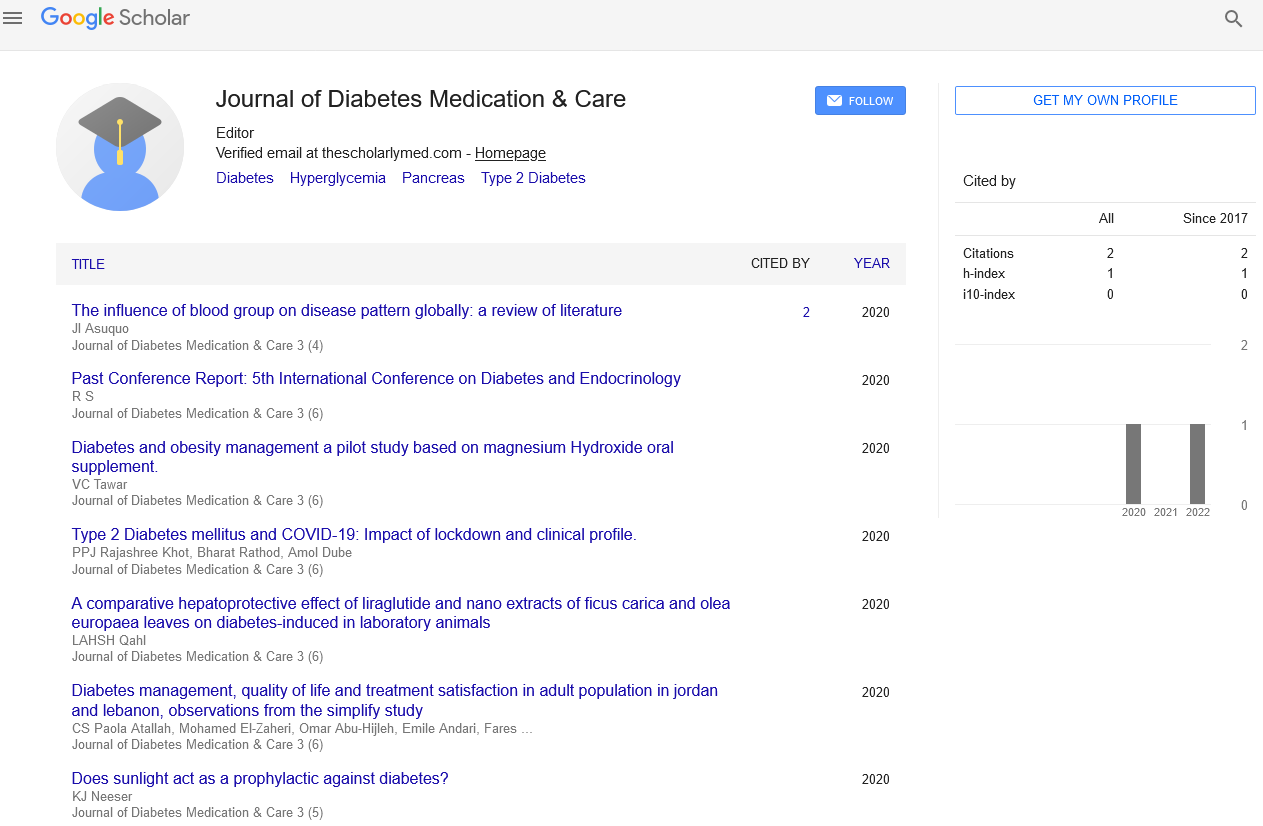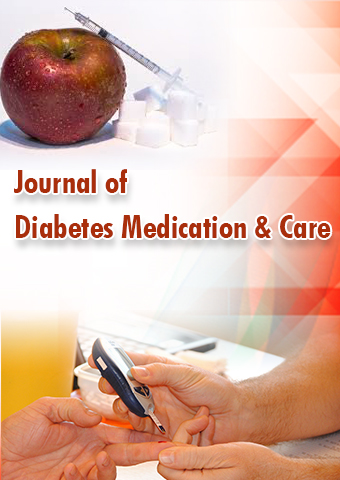Perspective - Journal of Diabetes Medication & Care (2023) Volume 6, Issue 5
Navigating the Sweet Path to Wellness
- Corresponding Author:
- Gally Rolls
Department of General Medicine, Coroico Unversity, Coroico, Bolivia
E-mail: gr@gmail.com
Received: 04-Sep-2023, Manuscript No. jdmc-23-119778; Editor assigned: 07-Sep-2023, PreQC No. jdmc-23-119778 (PQ); Reviewed: 21-Sep-2023, QC No. jdmc-23-119778; Revised: 03-Oct-2023, Manuscript No. jdmc-23-119778 (R); Published: 12-Oct-2023, DOI: 10.37532/jdmc.2023.6(5).134-136
Abstract
Diabetes, a chronic metabolic disorder that affects millions of people worldwide, has been on the rise in recent years. It is a condition characterized by high blood sugar levels, resulting from the body’s inability to properly utilize or produce insulin. The impact of diabetes on an individual’s health can be significant, leading to complications like heart disease, kidney problems, and nerve damage. However, managing diabetes doesn’t have to be a daunting challenge. In this article, we will explore a unique and holistic approach to diabetes management that encompasses lifestyle changes, nutrition, exercise, and emotional well-being. By adopting a multifaceted strategy, individuals can better control their blood sugar levels and lead a healthier, more fulfilling life.
Introduction
Diabetes, a chronic metabolic disorder that affects millions of people worldwide, has been on the rise in recent years. It is a condition characterized by high blood sugar levels, resulting from the body’s inability to properly utilize or produce insulin. The impact of diabetes on an individual’s health can be significant, leading to complications like heart disease, kidney problems, and nerve damage. However, managing diabetes doesn’t have to be a daunting challenge. In this article, we will explore a unique and holistic approach to diabetes management that encompasses lifestyle changes, nutrition, exercise, and emotional well-being. By adopting a multifaceted strategy, individuals can better control their blood sugar levels and lead a healthier, more fulfilling life.
Description
Understanding diabetes
Before diving into our holistic approach to diabetes management, it’s essential to understand the different types of diabetes and the factors contributing to this condition.
Types of diabetes
There are primarily three main types of diabetes:
Type 1 diabetes: This type results from the body’s immune system mistakenly attacking and destroying insulin-producing beta cells in the pancreas. People with type 1 diabetes need to take insulin regularly to survive.
Type 2 diabetes: The more common type, type 2 diabetes, occurs when the body cannot effectively use insulin or doesn’t produce enough of it. It is often linked to lifestyle factors, such as poor diet, lack of physical activity, and obesity.
Contributing factors
Several factors contribute to the development of diabetes, and understanding them is crucial for effective management. These factors include:
Genetic predisposition: A family history of diabetes can increase the risk of developing the condition.
Lifestyle choices: Sedentary lifestyles, unhealthy eating habits, and excessive sugar consumption can significantly contribute to type 2 diabetes.
Obesity: Being overweight or obese is a major risk factor for type 2 diabetes, as it can lead to insulin resistance.
Age: The risk of type 2 diabetes increases with age, especially after 45.
Age: The risk of developing type 2 diabetes increases with age, particularly after 45.
Gestational diabetes: Some women may develop diabetes during pregnancy, known as gestational diabetes, which can increase the risk of type 2 diabetes later in life.
Now that we’ve outlined the basics of diabetes, let’s delve into a holistic approach to its management.
Holistic diabetes management
Holistic diabetes management focuses on treating the person as a whole rather than just the disease itself. It considers all aspects of an individual’s life, including physical health, nutrition, exercise, emotional well-being, and support systems. This approach empowers individuals to take charge of their health and make sustainable changes to manage diabetes effectively.
Nutrition
Proper nutrition plays a pivotal role in diabetes management. Here are some dietary guidelines for maintaining stable blood sugar levels:
Balanced diet: Consume a balanced diet rich in fruits, vegetables, lean protein, whole grains, and healthy fats. This can help regulate blood sugar and reduce the risk of complications.
Carbohydrate counting: Keep track of your carbohydrate intake, as carbohydrates have the most significant impact on blood sugar levels. Choose complex carbohydrates, such as whole grains, over simple sugars.
Portion control: Be mindful of portion sizes to avoid overeating, which can cause blood sugar spikes.
Regular meals: Eat at regular intervals to prevent extreme fluctuations in blood sugar. Skipping meals can lead to hypoglycemia (low blood sugar).
Limit sugar and processed foods: Minimize the consumption of sugary and highly processed foods, as they can rapidly raise blood sugar levels.
Monitor glycemic index: Pay attention to the glycemic index of foods, as this can help in managing blood sugar levels. Low glycemic index foods have a smaller impact on blood sugar.
Stay hydrated: Drink plenty of water to stay hydrated and help maintain stable blood sugar levels.
Exercise
Regular physical activity is a cornerstone of diabetes management, providing a wide range of benefits:
Improved insulin sensitivity: Exercise can enhance the body’s ability to use insulin effectively, thereby reducing blood sugar levels.
Weight management: Physical activity helps with weight loss and weight maintenance, which is essential for those with type 2 diabetes.
Cardiovascular health: Exercise strengthens the heart and lowers the risk of heart disease, a common diabetes complication.
Stress reduction: Physical activity can reduce stress and improve emotional well-being, which is crucial in diabetes management.
Muscle health: Building and maintaining muscle through resistance training can further enhance insulin sensitivity.
It’s essential to choose activities that you enjoy, as this will make it easier to incorporate regular exercise into your routine. Whether it’s walking, swimming, dancing, or yoga, find something that suits your preferences and lifestyle.
Emotional well-being
Managing diabetes can be emotionally taxing, leading to stress, anxiety, and even depression. It’s important to prioritize emotional well-being as part of holistic diabetes management:
Seek support: Don’t hesitate to reach out to friends, family, or support groups for emotional support. Sharing your feelings and experiences can be therapeutic.
Stress management: Practice stress-reduction techniques such as mindfulness, meditation, or deep breathing exercises to help manage daily stressors.
Professional help: If you’re struggling with emotional well-being, consider speaking to a therapist or counselor who specializes in diabetes-related issues.
Set realistic goals: Break down your diabetes management goals into smaller, achievable steps to reduce feelings of overwhelm.
Stay informed: Education about diabetes can empower you to make informed decisions and reduce anxiety about the condition.
Conclusion
Diabetes management is a multifaceted journey that encompasses nutrition, exercise, emotional well-being, and medical care. Taking a holistic approach to diabetes management can empower individuals to lead healthy, fulfilling lives while effectively managing their blood sugar levels. By making informed choices, seeking support when needed, and prioritizing self-care, those with diabetes can navigate the sweet path to wellness.
Remember that diabetes management is not a one-size-fits-all solution. What works best for one person may not be suitable for another. It’s essential to work closely with healthcare professionals to develop a personalized diabetes management plan that addresses your unique needs and goals. With dedication, support, and a holistic approach to diabetes management, individuals can achieve better health and a brighter future.

